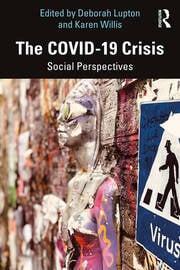1st Edition
The COVID-19 Crisis Social Perspectives
Since its emergence in early 2020, the COVID-19 crisis has affected every part of the world. Well beyond its health effects, the pandemic has wrought major changes in people’s everyday lives as they confront restrictions imposed by physical distancing and consequences such as loss of work, working or learning from home and reduced contact with family and friends.
This edited collection covers a diverse range of experiences, practices and representations across international contexts and cultures (UK, Europe, North America, South Africa, Australia and New Zealand). Together, these contributions offer a rich account of COVID society. They provide snapshots of what life was like for people in a variety of situations and locations living through the first months of the novel coronavirus crisis, including discussion not only of health-related experiences but also the impact on family, work, social life and leisure activities. The socio-material dimensions of quotidian practices are highlighted: death rituals, dating apps, online musical performances, fitness and exercise practices, the role of windows, healthcare work, parenting children learning at home, moving in public space as a blind person and many more diverse topics are explored. In doing so, the authors surface the feelings of strangeness and challenges to norms of practice that were part of many people’s experiences, highlighting the profound affective responses that accompanied the disruption to usual cultural forms of sociality and ritual in the wake of the COVID outbreak and restrictions on movement. The authors show how social relationships and social institutions were suspended, re-invented or transformed while social differences were brought to the fore.
At the macro level, the book includes localised and comparative analyses of political, health system and policy responses to the pandemic, and highlights the differences in representations and experiences of very different social groups, including people with disabilities, LGBTQI people, Dutch Muslim parents, healthcare workers in France and Australia, young adults living in northern Italy, performing artists and their audiences, exercisers in Australia and New Zealand, the Latin cultures of Spain and Italy, Asian-Americans and older people in Australia. This volume will appeal to undergraduates and postgraduates in sociology, cultural and media studies, medical humanities, anthropology, political science and cultural geography.
PART I: INTRODUCTION
1. COVID Society: Introduction to the Book
Deborah Lupton and Karen Willis
2. Contextualising COVID-19: Sociocultural Perspectives on Contagion
Deborah Lupton
PART II: SPACE, THE BODY AND MOBILITIES
3. Moving Target, Moving Parts: The Multiple Mobilities of the COVID-19 Pandemic
Nicola Burns, Luca Follis, Karolina Follis and Janine Morley
4. Physical Activity and Bodily Boundaries in Times of Pandemic
Holly Thorpe, Julie Brice and Marianne Clark
5. City Flows During Pandemics: Zooming in on Windows
Olimpia Mosteanu
6. The Politics of Touch-Based Help for Visually Impaired Persons During the COVID-19 Pandemic: An Autoethnographic Account
Heidi Lourens
PART III: INTIMACIES, SOCIALITIES AND CONNECTIONS
7. #DatingWhileDistancing: Dating Apps as Digital Health Technologies During the COVID-19 Pandemic
David Myles, Stefanie Duguay and Christopher Dietzel
8. ‘Unhome’ Sweet Home: The Construction of New Normalities in Italy During COVID-19
Veronica Moretti and Antonio Maturo
9. Queer and Crip Temporalities During COVID-19: Sexual Practices, Risk and Responsibility
Ryan Thorneycroft and Lucy Nicholas
10. Isol-AID, Art and Wellbeing: Posthuman Community Amid COVID-19
Marissa Willcox, Anna Hickey-Moody and Anne M. Harris
PART IV: HEALTHCARE PRACTICES AND SYSTEMS
11. Strange Times in Ireland: Death and the Meaning of Loss Under COVID-19
Jo Murphy-Lawless
12. Between an Ethics of Care and Scientific Uncertainty: Dilemmas of General Practitioners in Marseille
Romain Lutaud, Jeremy K. Ward, Gaëtan Gentile and Pierre Verger
13. Post-pandemic Routes in the Context of Latin Countries: The Impact of COVID-19 in Italy and Spain
Anna Sendra, Jordi Farré, Alessandro Lovari and Linda Lombi
14. Risky Work: Providing Healthcare in the Age of COVID-19
Karen Willis and Natasha Smallwood
PART V: MARGINALISATION AND DISCRIMINATION
15. The Plight of the Parent-Citizen? Examples of Resisting (Self-)Responsibilisation and Stigmatisation by Dutch Muslim Parents and Organisations During the COVID-19 Crisis
Alex Schenkels, Sakina Loukili and Paul Mutsaers
16. Anti-Asian Racism, Xenophobia and Asian American Health During COVID-19
Aggie J. Yellow Horse
17. Ageism and Risk During the Coronavirus Pandemic
Peta S. Cook, Cassie Curryer, Susan Banks, Barbara Barbosa Neves, Maho Omori, Annetta H. Mallon and Jack Lam
Biography
Deborah Lupton is SHARP Professor in the Centre for Social Research in Health and the Social Policy Research Centre at the University of New South Wales (UNSW) Sydney, Australia, leading the Vitalities Lab and the UNSW Node of the Australian Research Council Centre of Excellence for Automated Decision-Making + Society.
Karen Willis is Professor, School of Allied Health, Human Services and Sport, La Trobe University, Melbourne, Australia, and Honorary Professor, Division of Critical Care and Investigative Services, Royal Melbourne Hospital.




